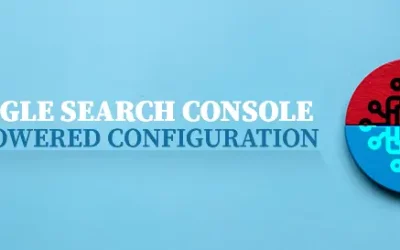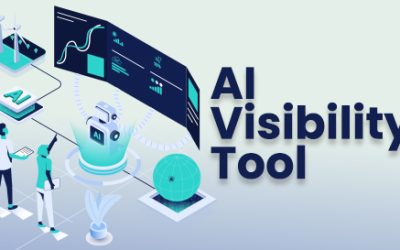Not too long ago – maybe, five years back – the ultimate digital bragging right was “We’re on page one of Google.”
Fast forward to today, and the table has turned on its head. You could own the top spot for your industry’s biggest keywords, but if AI platforms like ChatGPT, Claude, Gemini, or Perplexity aren’t mentioning you, you might as well be invisible to a growing audience that never even visits a search engine.
The reality? Search is no longer a single destination; it’s a conversation. And if your name isn’t part of that conversation, you’re not just losing clicks; you’re losing relevance in AI search visibility.
The Big Shift in Search Behavior
If you rewind ten years into the recent past, the typical Google journey was fairly simple and straightforward: a keyword entered into the search, scroll through the results, and a click on the most promising link. Today, that journey is being replaced (already) with something faster and more conversational—what we call now as AI-powered search.
People are no longer turning to search engines for an answer. They are bypassing it altogether and turning directly to AI-powered tools for information, ideas, and recommendations. Instead of typing keywords into a search bar, they’re asking questions in a conversational mode and getting fully-structured answers; instantly.
Take a moment to think about it:
- Planning a trip?
You no longer have to visit 10 different sites to gather info. Just ask an AI assistant for an itinerary.
- Choosing a software tool?
Ask an AI tool for a comparison. It’ll generate a detailed analysis within seconds.
- Searching for services in your area?
Again, AI will give you a shortlist without even having to open a Google results page.
So, is it a matter of convenience? Yes and no.
This shift isn’t just about convenience. It’s also about trust. AI tools aren’t showing you random links—they’re curating what they believe is the best information for you at the moment. And if your business isn’t part of those curated answers, you’re missing the first (and sometimes only) opportunity to be discovered.
The New Visibility Metric: AI Citations
In this new era of AI-driven search, visibility is no longer defined by which page you rank on Google. It’s about whether the top AI assistants mention you when delivering answers. These mentions, known as AI citations or AI content citations, have become the new currency of online visibility.
An AI citation happens when an AI-generated response references your brand, content, or expertise. And unlike traditional backlinks, these citations aren’t just about high SEO rankings; they directly put your name in front of the user at the exact moment they’re looking for solutions.
For an AI assistant to cite you at the right moment, you need to get a few things right. Here are a few strategies to get cited by AI tools:
- Your content must be discoverable: This means AI systems should be able to find and understand it.
- Your content must be trusted: The content or expertise mentioned must be accurate, relevant, and reliable by the AI’s algorithms.
- Your brand must be referenced elsewhere: This is because AI relies on various sources to validate its recommendations.
In short, being cited in AI answers signals that you’ve crossed the threshold from “present online” to “recognized authority.”
Why This Matters More Than Google Rankings
It’s time you digest the hard truth: AI answers leapfrog the SERPs.
- A well-cited competitor could get recommended by an AI assistant while your #1 Google listing goes unseen.
- Ranking does not equal recommendation. Even perfect on-page SEO can no longer guarantee the fact that you’ll be chosen as an AI reference if your content isn’t structured or credible enough for generative engines.
- AI answers act as a ready-made trust filter. People often take them at face value, and if you’re in the answer, it means you’ve already passed the credibility test.
The shift is clear: being present on Google is no longer enough. You need to be present and preferred in AI responses. And that requires a different kind of optimization—one that blends traditional SEO with AI visibility strategies.
How to Get Noticed by AI Search Engines
Now, to answer the question that brought all of us here: how to improve AI search visibility and stay relevant?
Winning AI citations doesn’t happen by accident. You have to actively prepare your content and brand for discovery by AI systems. Here’s how:
- Answer with Precision and Clarity
- AI thrives on content that’s direct and unambiguous.
- Use headings that match common user queries.
- Provide concise, factual answers before diving into details.
- Include summaries or key takeaways at the end of articles.
- Diversify Your Authority Footprint
- AI engines weigh third-party validation heavily.
- Get quoted in industry publications.
- Participate in podcasts, webinars, and panel discussions.
- Earn mentions in reputable news outlets or niche blogs.
- Make Your Content AI-friendly with Structured Data
- AI models parse structured data faster and more accurately.
- Implement FAQ schema to match question-based searches.
- Use HowTo schema for process-driven content.
- Include rich metadata for articles and author profiles.
- Craft “Liftable” Quotes
- Short, insight-rich sentences are AI gold.
- Create one-sentence definitions.
- Include stat-backed statements.
- Highlight original research findings.
- Be Present across Multiple Channels
- AI draws from diverse sources, not just your website.
- Answer questions in industry forums.
- Engage thoughtfully on LinkedIn and X (formerly Twitter).
- Ensure consistent messaging across all touchpoints.
From Keywords to Conversations – Rethinking Your Content
In the Google era, visibility meant ranking for the right keywords.
However, in the ChatGPT era, visibility depends on whether your content has the quality to become part of an AI-generated conversation. This would require thinking beyond search queries and figuring out how your information can be used to answer a question in a natural, conversational flow.
Here’s how to AI search ranking factors:
- From Lists to Insights: Instead of publishing “Top 10” lists, create authoritative, detailed explanations that AI can reference for nuanced answers.
- From Static Pages to Context-rich Resources: Break down complex topics into digestible, interlinked pieces so AI can connect them naturally when responding to users.
- From SEO to GEO (Generative Engine Optimization): Structure your content to include clear definitions, real-world context, and credible sources so that AI trusts your site as a go-to reference.
By rethinking your content this way, you’re no longer setting up for “clicks”, but you’re working your way towards earning a seat at the table where AI answers are formed.
What Is the Road Ahead for SEO?
Let me get one thing straight: SEO isn’t dead — it’s evolving.
The winners in this new domain will be the brands that adapt to both worlds:
- Still optimizing for Google’s algorithms, and
- Simultaneously optimizing for AI’s recommendation logic.
Being seen on page one of Google is great, but being named in a trusted AI answer is better.
So, ask yourself: if someone asked ChatGPT about your industry right now… would it mention you?
If the answer’s no, the time to change that is now.




